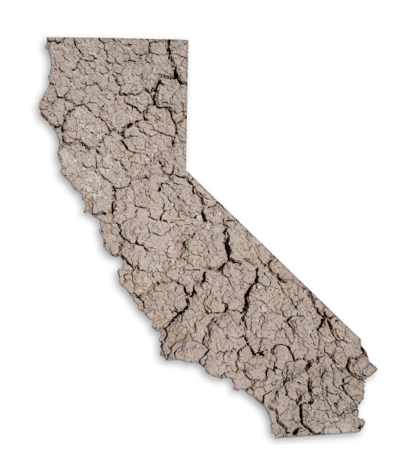Responding to California’s long-term drought and the effects of climate change on the state’s water supply and imperiled wildlife, U.S. Secretary of the Interior Sally Jewell has issued a Secretarial Order directing the Department of the Interior and its bureaus to take timely actions to help California address and manage the situation.
“This Secretarial Order is a practical and broad-based strategy to help protect California’s water lifeline for present and future generations,” said Deputy Secretary Michael L. Connor. “This order will ensure the integration of the Department’s actions with those of the State of California to provide a reliable drinking water supply for the public, sustain California’s agriculture, and continue to protect the Bay Delta (Sacramento-San Joaquin Delta) ecosystem and enhance the conservation of species.”
“Long-term drought, fueled by climate change, has adversely affected the state’s water supplies, exacerbated effects of water operations on imperiled species, impacted water quality, and added to the stressors affecting the health of California’s unique ecosystems, particularly the Sacramento-San Joaquin Delta (Bay-Delta),” the order states.
The Order has been developed in consultation with the state agencies and other federal agencies. It provides direction for the Department, and particularly Reclamation and the Fish and Wildlife Service (FWS), along with scientific support and technical advice from the United States Geological Services (USGS), to complete the technical, scientific, and analytical work necessary to make permitting, regulatory, and other decisions associated with various water initiatives.
These actions track “closely with the state’s multi-pronged Water Action Plan and commits the federal government to a timely review of the California WaterFix project,” said California Governor Edmund G. Brown Jr. “This state-federal partnership is what’s needed to improve water reliability for residents and farmers and protect vulnerable ecosystems.”
The Secretarial Order calls for six actions:
- California WaterFix Environmental Review —The order directs Interior’s Bureau of Reclamation and U.S. Fish and Wildlife Service to allocate available resources to complete the Biological Opinions under Section 7 of the Endangered Species Act and a Record of Decision on the environmental documents for California WaterFix in a timely manner. The Secretarial Order directs FWS to take all necessary actions to issue an initial Draft Biological Opinion in January 2017 and a final Draft Biological Opinion by March 2017 after incorporating the results of independent scientific peer reviews. A final Biological Opinion is to be issued by April 2017. It specifies that the Department, working with the State and others, will promptly review and consider any information received after publication of the Final EIR/EIS and issuance of the Biological Opinions, and will then be prepared to sign a Record of Decision. This decision will be made by the next Interior Secretary within the Trump administration.
- Collaborative Delta Science Engagement Process — The order directs Reclamation, FWS, and USGS to work collaboratively with the state and other federal agencies to use the Adaptive Management Framework developed as part of California WaterFix to help guide scientific studies and monitoring, assist with Central Valley Project and State Water Project operations, and achieve the co-equal goals for the Bay Delta. Implementation of the framework will include an annual review process that develops approaches to the refinement of monitoring and restoration activities that measure species’ populations. Annual review results will be made available to the public.
- Delta Smelt Resiliency Strategy— This strategy addresses both the risk to the critically endangered Delta smelt and the risk to water supplies. The order directs Reclamation and FWS to closely coordinate with state and federal agencies and others in implementing all facets of the Strategy. During the next several years, Reclamation will acquire or otherwise make available up to 250,000 acre-feet/year of outflow above current state water quality permit requirements. This additional outflow may include using water transfers, changes in exports from the Bay-Delta, releases from upstream storage, or other measures.
- Re-initiation of Consultation under the Endangered Species Act on Coordinated Long-Term Operations of the Central Valley Project and State Water Project— The order directs Reclamation and FWS to work with other agencies to carry out the work necessary to complete the recently re-initiated consultation on long term operations of the Central Valley Project and State Water Project.
- Active Engagement in Development of Voluntary Agreements for Flow Requirements and Coordination on Flows with ESA Requirements– Reclamation, FWS and others will provide information to the State Water Resources Control Board as part of its Bay-Delta Plan initiative. They will coordinate with the California Natural Resources Agency in at least the following areas: engage key stakeholders to develop voluntary agreements to increase flows and integrate flow and non-flow measures; providing information necessary to establish water quality standards to meet fish, wildlife, and ecosystem goals; and, ensure that requirements developed through the Bay-Delta Plan process are considered in assessing requirements and compliance under the Biological Opinions related to the Central Valley Project and State Water Project.
- Winter-run Chinook “Species in the Spotlight” Action Plan— The “Species in the Spotlight” Action Plan is an essential element of reducing both near-term and long-term risks to Winter-run Chinook salmon. Developed by the National Marine Fisheries Service (NMFS) in 2016 as a high priority action plan that would guide allocation of NMFS resources, as well as attract funding from partner agencies and stakeholders, Reclamation and FWS will work with NMFS to incorporate actions into priorities developed under the Adaptive Management Framework.
 California Water News Daily Your Source For Water News in California
California Water News Daily Your Source For Water News in California


